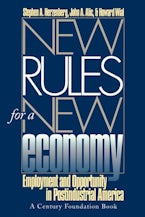This thought-provoking book... makes a persuasive case that supra-enterprise institutions can and should regulate the new economy and are not some residue of an earlier phase of 'organized capitalism' which has had its day.
(British Journal of Industrial Relations) A comprehensive theoretical perspective that is grounded in detailed case research, New Rules For a New Economy points to the way to a better future, not just for elite knowledge workers, but for everyone. New Rules For a New Economy is a superb contribution to today's policy discussions on shaping the American economy for the needs of service sector workers in the new millennium.
(Wisconsin Bookwatch) A concise survey of labor market problems and innovative approaches to deal with them. Recommended for public, academic, and professional library collections.
(Choice) New Rules for a New Economy is long overdue. Authors Herzenberg, Alie, and Wial deliver a keenly perceptive study, broad in scope but also generous in case-study-based detail.... To understand work in the United States today, this is the single most important book to read.... The authors have produced a compelling guide to the workplace of today and shown the possibilities for a better workplace of tomorrow.
(Dollars and Sense) One key proposal for buttressing the power of workers in a global economy is the creation of craft-type unions, which cut across companies in an industry.... New Rules for a New Economy has something to offer, at a time when people are trying to understand the combination of economic vigor and risk with which we live.
(Business Week) Written by economic consultants, this book is a treatise on the changing demographics of the American workforce and how corporations should work to alter job patterns in order to adapt to evolving employment trends.... Despite the technological and economic growth since WWII, the majority of manufacturing jobs remain low paying and provide few prospects for future growth. According to the authors, there is little chance that the level of service provided by these workers will improve without changes in these jobs. Among the strategies the authors advise: raising the minimum wage and expanding training programs across different companies.... Quite interesting.
(Publishers Weekly)

